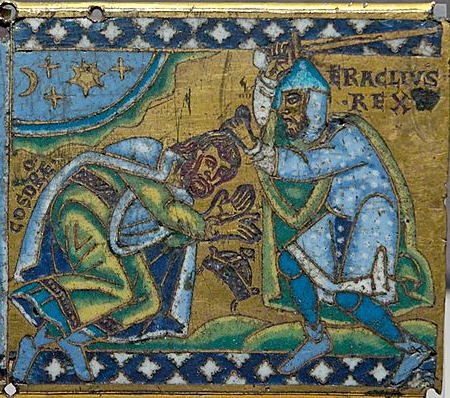 |
| Emperor Heraclius receiving the submission of Persian King Khosrau II |
A Glimpse into the Past
Pageantry has always been part of nations. Partly it exists to stroke the egos of the leadership class and partly to impress the common people as to how important that leadership class is and that they must be respected as their "betters".
We are blessed with a fairly large number of first person accounts and histories from the Roman Republic and the early Empire periods. But those accounts become few and far between as we go deeper into the Byzantine period.
In the book Heraclius, Emperor of Byzantium the author Walter Kaegi provides a number of quotations from original accounts of official events during the Emperor's reign (610-641AD).
At this point below we are 162 years after the fall of Rome to the barbarians. Imperial pageantry was in full swing as the 63 year old Eastern Emperor Heraclius crowned his son Constantine as co-Emperor to strengthen his dynasty's hold on the throne.
Pageantry helped present an image to the public of a strong and powerful empire and government during troubled times of invasion by Slavs in the Balkans and Muslims in Syria.
 |
| Roman coin depicting Heraclius and his sons Constantine and Heraklonas each with a crown. |
July 4, 638
. . . on 4 July, eleventh indiction, the the Imperator (Autokrator) and great Emperor (Heraclius) wishing to announce the promotion of his son from the rank of Caesar to the dignity of Emperor acted in the following manner.
The Patriarch and all the Senators were summoned. The Patriarch approached the Emperor, with Constantine his (Heraklonas') brother being present. Prayer took place in the chapel of the holy Stephen of Daphen. His kamelaukion (a kind of cap or head covering) was removed from his head and the Imperial crown was placed on his head.
There was a prayer for the despotes David as the kamelaukion was placed on his head as he ascended to the rank of Caesar.
That having been done, the most glorious Patricians were summoned according to custom, and they entered the Augusterm and received the great Emperor and his sons, with the Caesar being present.
All the ex-consuls and those with ranks as high as illustres departed and stood on the steps of the forecourt. The gates of the armory we opened and all the standards (signa) and scholae and demes (factions) entered. The Patriarch exited with them (the Emperor and his sons). And with everyone acclaiming them, the Emperor and his sons departed for the Great Church. Everything took place according to form in the Great Church.
January 12, 639
On the first month of January, 12th indiction, the Emperor made a procession to the Great Church.
The despotes Constantine departed with him, wearing a tunic, and despotes Heraclius and (his, the Emperor's) son wore the toga praetextata, and supported on the arm of his own brother.
The Patricians Niketas and John and the Patrician attached to Iesdem (Yazdin) and the Patrician Dometios and the magister Eustathios wore togas, while the other officials wore pure silk tunics, and some of the ex-consuls wore the consular loros (sash). Having entered the Great Church they lit candles and everything went according to form and was valid.
(Editor - We see a splendid ceremony with great attention to dress and a show harmony within the Imperial family. The presence of the Sasanian Perisan dignitary Yazdin, former Treasurer of the Persian Empire, underscores the vain hope of Rome and Persia working together even as both empires were being over run by Muslim armies.)
 |
| The impressive Great Church Hagia Sophia was prominently featured in many important Roman functions. |
January 15, 639
(Editor - This passage records a public demonstration of Imperial and familial solidarity with Heraclius' second wife Martina and their families. Both Latin and Greek are used in the text. The call "to conquer" is a reminder that the Empire is being invaded on every front as they speak.)
On the fourth of the same month, there being a horse race, the Emperor received the usual persons in the Augusteum, and he ordered them to come to him in the Hippodrome.
He received all of the officials, and having entered the Augusteum, they found the Emperor and the Augusta standing. In front of them stood Augistina and Anastasia, their daughters and Augustae.
The Patricians were present and on the right stood the other children of the Emperor, and on the left were the cubicularii (chamberlains) and they cried out, saying:
"Good fortune to the government, good fortune to the government, good fortune to the government. Heraclius Augustus, conquer! Anastasia Martina, conquer! Constantine Augustus, conquer! Heraclius Augustus, conquer! Augustina Augusta, conquer! Davis Caesar, conquer! Martina most noble, conquer!"
Then the Emperor left for the Hippodrome.
(Heraclius - Emperor of Byzantium, Chapter 8) (Heraclius)

No comments:
Post a Comment